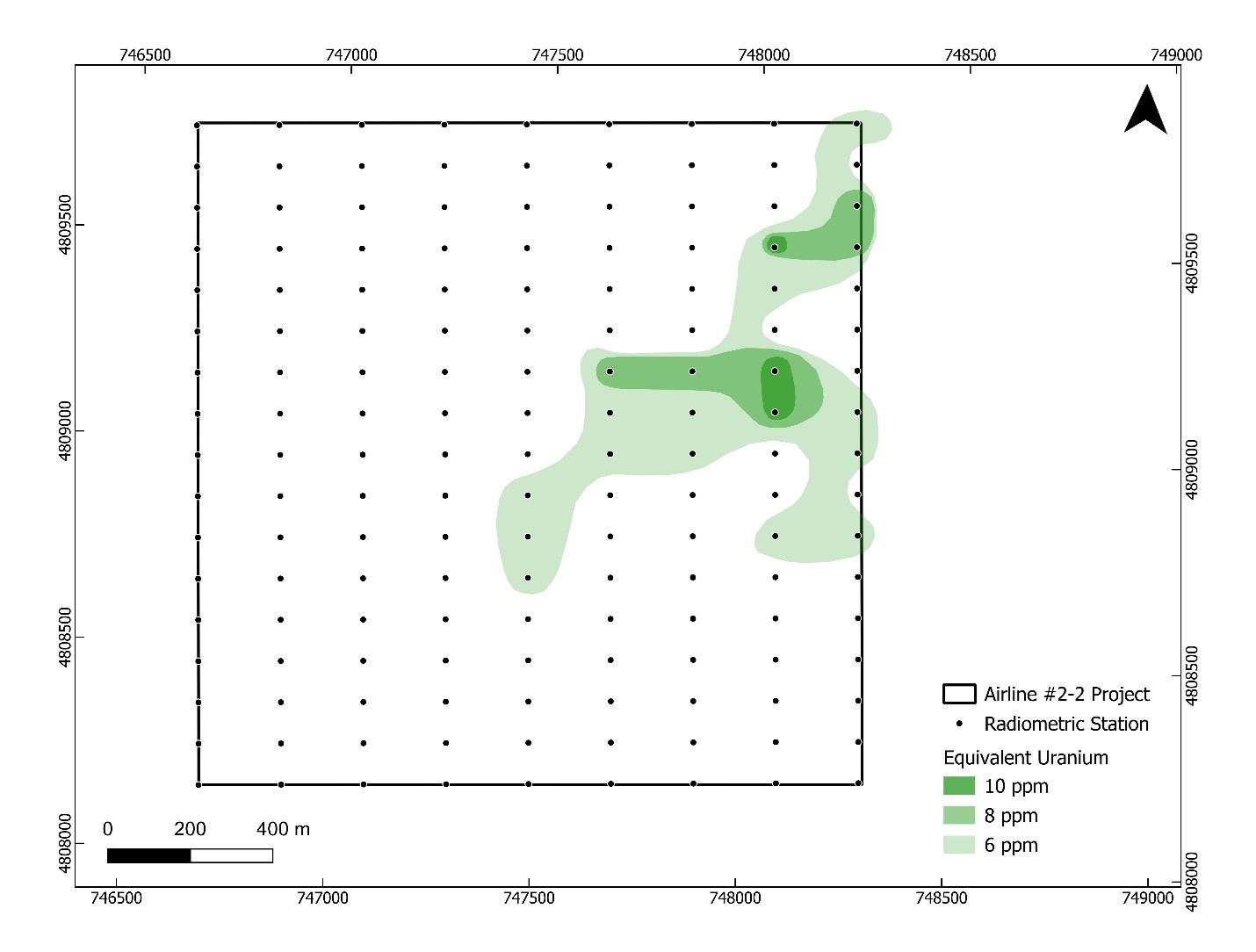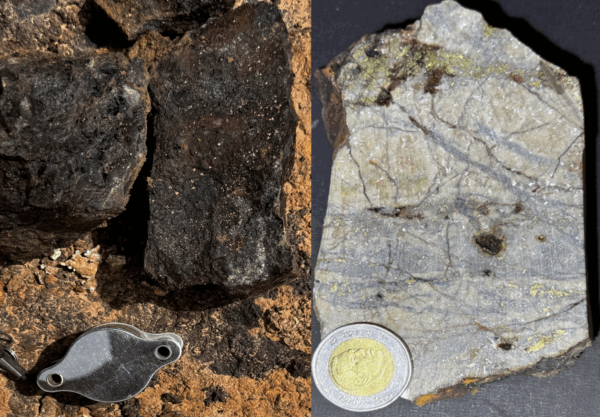CALGARY, Alberta, Nov. 19, 2024 (GLOBE NEWSWIRE) — Global Uranium Corp. (CSE: GURN | OTC: GURFF | FRA: Q3J) (the “Company”) is pleased to announce the results of its recently completed radiometric survey on select mineral claims in the Wyoming Copper Mountain and Great Divide Districts. The survey, now analyzed and interpreted, has successfully identified prospective uranium anomalies across the Airline #2 and Big Bend claims, reinforcing their exploration potential.
Survey Analysis and Interpretation
The radiometric survey covered four project areas: the Airline #2-1 and Airline #2-2 claims in the Copper Mountain District, and the Big Bend-1 and Big Bend-2 claims in the Great Divide District. Data analysis focused on quantifying equivalent uranium concentrations, highlighting anomalous zones, and refining the exploration strategy for these claims.
Key Findings
- Airline #2-1: A total of 82 data points were collected, showing equivalent uranium values ranging from 2.4 to 91.9 ppm. This area displays a broad range of uranium concentrations, with several high-value zones identified. Priority targets include clusters of elevated uranium levels, notably concentrated in the northern and eastern portions of the surveyed area.
- Airline #2-2: 156 data points were collected, showing equivalent uranium values ranging from 0.7 to 12.1 ppm, suggesting lower but stable uranium levels compared to Airline #2-1. The mapped contours reveal a relatively uniform distribution of radiometric values, with limited high-concentration zones, indicating that this area has fewer distinct anomalies and may present lower-priority targets for further exploration.
- Big Bend-1: In this area, 134 data points show equivalent uranium values from 1.7 to 38.4 ppm. The dataset and map together highlight promising anomalies in the northern and central portions of the area, corresponding with higher uranium readings. These anomalies make Big Bend-1 a viable target for focused follow-up and exploration.
- Big Bend-2: A smaller dataset of 26 points reveals equivalent uranium values between 5.3 and 15.0 ppm. Mapped contours show moderate yet consistent uranium levels across the area, with a few localized zones of elevated values that can be prioritized as secondary targets for additional investigation.
“The analytical results from our recent radiometric survey in Wyoming underscore the exploration potential of our Airline #2 and Big Bend claims,” commented Ungad Chadda, CEO of Global Uranium. “The identification of these high-priority targets positions Global Uranium well to advance exploration and assess the potential of the Company’s holdings in a district with historical uranium production.”

Figure 1 The Airline #2-1 claim with equivalent uranium contours. High-concentration zones are clustered primarily in the northern and eastern parts of the survey area.

Figure 2 The Airline #2-2 claim with equivalent uranium contours, displaying low but stable uranium levels, with less pronounced anomalies.

Figure 3 The Big Bend-1 claim with equivalent uranium contours. Notable anomalies are visible in the northern and central portions of the map.

Figure 4 The Big Bend-2 claim with equivalent uranium contours. Moderate but consistent uranium levels are displayed, with a few elevated zones that offer secondary targets for further exploration.
Methodology
The primary objective of the radiometric survey was to detect uranium anomalies across select claims and establish baseline data to inform drill targeting. The survey method employed standardized grid-based radiometric sampling with a handheld scintillometer to measure equivalent uranium concentration at each station. Each claim area was mapped with a defined grid pattern to ensure comprehensive coverage and data consistency. The Airline #2-1 and Big Bend-2 projects had 100-meter by 100-meter station spacing, while the Airline #2-2 and Big Bend-1 projects followed 100-meter by 200-meter spacing. The survey designs provided broad coverage for initial anomaly detection. Radiometric assays were 4-minutes long, and acquired over clean, dry, and vegetation-free soil whenever possible. Once collected, the data underwent standard processing to generate maps of equivalent uranium concentrations, highlighting areas of elevated readings. Data was then visualized in contour maps, delineating anomalous zones across several target areas.
QA/QC Analysis
Field duplicate measurements were taken at random to ensure that equipment readings were precise and could be reliably used to compare relative uranium concentrations across survey grids. The Relative Percent Difference (“RPD”) analysis reveals that most duplicate equivalent uranium measurements across the survey exhibit acceptable consistency, with RPD values below or near 20%. This suggests that the radiometric survey produced reliable and repeatable measurements across different project areas. Instances where RPD values exceed 25% indicate some moderate variability, which could stem from natural geological heterogeneity in uranium distribution rather than measurement inconsistencies. The data quality is therefore considered robust, with most variations falling within acceptable limits for field duplicate analyses.
Next Steps
As Global Uranium advances its Wyoming group of uranium projects, the Company is considering a series of targeted surveys to enhance drill targeting and refine the understanding of uranium-bearing structures. With winter approaching, the focus will be on geophysical methods that perform well in snowy conditions, specifically those that are able to target the geological and geochemical features associated with roll-front uranium mineralization. Magnetic surveys could help map structural features and fault zones within the sedimentary sequence by identifying key pathways and redox boundaries that control uranium mineralization. Passive seismic surveys could delineate sedimentary layers and subsurface traps within sandstone units that commonly host roll-front mineralization. As conditions permit, Global Uranium is also considering resistivity and IP surveys in late-winter or early-spring to detect conductivity contrasts and pinpoint reducing environments where uranium may precipitate. Together, these surveys could provide the Company with a detailed, multi-layered view of the geological features controlling uranium mineralization on the Wyoming group of projects.
The scientific and technical content of this news release has been reviewed and approved by Jared Suchan, Ph.D., P.Geo., VP of Exploration at the Company, and a “Qualified Person” as defined by National Instrument 43-101.
The Qualified Person (QP) verified the radiometric data by reviewing it for quality and consistency and analyzing the QA/QC data to ensure accuracy. This included checking duplicate readings, cross-referencing field observations with recorded measurements, and ensuring that all datasets adhered to industry-standard reporting and exploration practices.
About Global Uranium Corp.
Global Uranium Corp. focuses on exploring and developing uranium assets primarily in North America. The Company currently holds key uranium projects: the Wing Lake Property in the Mudjatik Domain of Northern Saskatchewan, Canada; the Northwest Athabasca Joint Venture with Forum Energy Metals Corp. and NexGen Energy Ltd. in the Northwest Athabasca region of Saskatchewan, Canada; and the Great Divide Basin District Projects, the Gas Hills District Projects, and the Copper Mountain District Projects in Wyoming, USA.
On Behalf of The Management Team
Ungad Chadda
CEO
587-330-0045
[email protected]
Forward-Looking Statements
Certain statements contained in this press release constitute forward-looking information. These statements relate to future events or future performance. The use of any of the words “could”, “intend”, “expect”, “believe”, “will”, “projected”, “estimated” and similar expressions and statements relating to matters that are not historical facts are intended to identify forward-looking information and are based on the Company’s current belief or assumptions as to the outcome and timing of such future events. In particular, this press release contains forward-looking information relating to, among other things, the Company’s intention to continue its exploration efforts on the Wyoming group of uranium projects with the aim of enhancing drill targeting and refining the understanding of uranium-bearing structures, the Company’s proposed exploration activities related thereto and the intended outcomes of such exploration activities; and the prospectivity of the uranium anomalies identified and the suitability of these anomalies for further exploration.
Various assumptions or factors are typically applied in drawing conclusions or making the forecasts or projections set out in forward-looking information, including, in respect of the forward-looking information included in this press release, the assumption that: the Company will continue to explore the Wyoming group of uranium projects; and that the uranium mineralization anomalies observed across the Airline #2-1 and Airline #2-2 claims in the Copper Mountain District, and the Big Bend-1 and Big Bend-2 claims in the Great Divide District are representative of the actual uranium mineralization on these claims.
Although forward-looking information is based on the reasonable assumptions of the Company’s management, there can be no assurance that any forward-looking information will prove to be accurate. Forward-looking information involves known and unknown risks, uncertainties and other factors which may cause the actual results, performance or achievements to be materially different from any future results, performance or achievements expressed or implied by the forward-looking information. Such factors include the risk that the Company may not continue with its exploration of the Wyoming group of uranium projects, whether as a result of a lack of financial resources, a failure to receive the requisite permits or approvals, the discretion of management or otherwise; the risk that the Company may not proceed with the exploration of the Wyoming group of uranium projects as currently contemplated and, that, even if the Company does proceed with such exploration activities, such exploration activities may not achieve their anticipated outcomes; risks inherent in the exploration and development of mineral deposits, including risks relating to receiving requisite permits and approvals, changes in project parameters or delays as plans continue to be redefined, that mineral exploration is inherently uncertain and that the results of mineral exploration may not be indicative of the actual geology or mineralization of a project; the risk that mineral exploration may be unsuccessful or fail to achieve the results anticipated by the Company; and the other risks and factors identified by the Company in its continuous disclosure filings, filed on the Company’s SEDAR+ profile at www.sedarplus.ca.
The forward-looking information contained in this release is made as of the date hereof, and the Company is not obligated to update or revise any forward-looking information, whether as a result of new information, future events or otherwise, except as required by applicable securities laws. Because of the risks, uncertainties and assumptions contained herein, investors should not place undue reliance on forward-looking information. The foregoing statements expressly qualify any forward-looking information contained herein.
The Canadian Securities Exchange has not reviewed, approved, or disapproved the contents of this press release.
Photos accompanying this announcement are available at
https://www.globenewswire.com/NewsRoom/AttachmentNg/705c6257-54f1-4694-8626-7364e6b7edca
https://www.globenewswire.com/NewsRoom/AttachmentNg/d571de64-148e-4340-b1d4-80d75082f729
https://www.globenewswire.com/NewsRoom/AttachmentNg/a2845689-35a0-4580-bcb7-1ceec852e9fa
https://www.globenewswire.com/NewsRoom/AttachmentNg/31498a53-120b-4fd2-9233-74e688199b14




